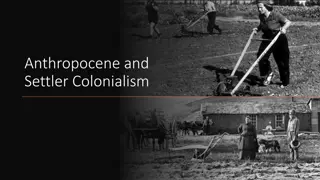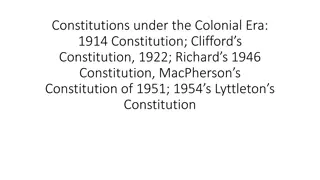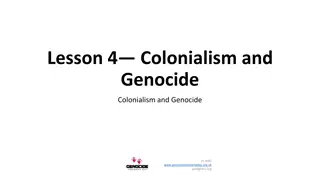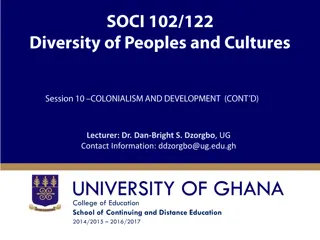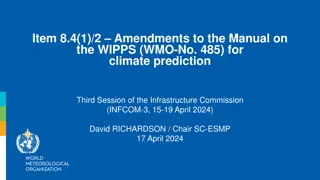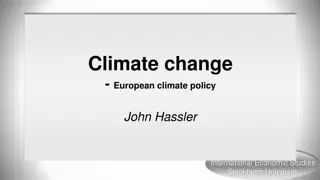Colonialism, Climate, and Disease: Impact on European Settlers
Debates on acclimatization and colonial diseases reveal shifting attitudes towards Europeans settling in tropical climates. The relationship between climate, race, and disease played a crucial role in shaping colonial ideologies, leading to the emergence of modern ideas of race and segregation. Medical knowledge, acclimatization theories, and perceptions of racial boundaries influenced the outcomes in different colonial contexts. The interconnectedness of empire, climate, and race highlighted the challenges faced by European settlers in adapting to tropical environments.
Download Presentation

Please find below an Image/Link to download the presentation.
The content on the website is provided AS IS for your information and personal use only. It may not be sold, licensed, or shared on other websites without obtaining consent from the author.If you encounter any issues during the download, it is possible that the publisher has removed the file from their server.
You are allowed to download the files provided on this website for personal or commercial use, subject to the condition that they are used lawfully. All files are the property of their respective owners.
The content on the website is provided AS IS for your information and personal use only. It may not be sold, licensed, or shared on other websites without obtaining consent from the author.
E N D
Presentation Transcript
Week 7 Disease and the Environment
Pratik Chakrabarti,Ch. 4: Colonialism, Climate and Race, inMedicine and Empire, 1600-1960, (Basingstoke, 2014), pp. 57-72. Acclimatization was central to debates about the suitability for Europeans to settle and dominate colonial tropical climates. And with increasing epidemics of colonial diseases in Europe, attitudes towards acclimatisation were increasingly pessimistic. Colonial diseases increasingly linked to the specific climates of regions, eg: the heat of tropical regions was suggested to encourage decay which created bad airs/vapours (Miasma) which produced disease. Stances on acclimatization and climate were also linked to development of ideas about human origins (Monogenist and polygenist theories). As more pessimistic attitudes emerged about acclimatisation, theorists increasingly promoted idea of climatic determinism, which led to more rigid ideas about racial characteristics. This suggested to be basis of modern racism. This sense that races were fundamentally different created a more segregational model of colonisation during 18thC/19thC (in the tropics, Europeans confined themselves to remote hill stations, spas and sanitary enclaves) to keep cultures separated and avoid assimilation and potential degeneracy of Europeans in the colonies. Quote At the heart of this transformation and the emergence of modern ideas of race was the question of empire. Colonialism defined these transformations in the ideas of climate and race in the nineteenth century (p. 66)
Mark Harrison, The Tender Frame of Man: Disease, Climate, and Racial Difference in India and the West Indies, 1760-1860 , Bulletin of the History of Medicine, 70, (1996), pp. 68-93. Tropical diseases viewed as different from other variations due to their nature and differing symptoms and severity, and this meant that some questioned the extent to which European medical knowledge would have relevance in India and West Indies Acclimatisation fitted within humoral understanding of the body, eg: physician Richard Towne suggested, in 1776, that the warm weather of the Caribbean appeared to agree most with persons of a phlegmatic, "moist" disposition Despite belief in the cultural superiority of Europeans, 18thC medical practitioners often recommended settlers to take up certain indigenous customs to accelerate the process of acclimatisation Growing pessimism about the potential of European acclimatisation was due to the hardening of perceived racial boundaries that were used to justify slavery and the British conquest of India Colonial events also influenced hardening of racial boundaries, eg: Indian rebellion in 1857 suggested to highlight the lack of suitability of Europeans to Indian climate (as Brit soldiers already had been decimated by diseases like cholera and enteric fever) Quote While climatic determinism still had its adherents, medical men in the colonies were increasingly convinced that European bodies were very different from those of their subjects, and that immunity to diseases of the tropics could not be acquired simply by residing there
David Livingstone, Human Acclimatisation: Perspectives on a Contested Field of Inquiry in Science, Medicine, and Geography , History of Science, 25 (1987), pp. 359-394. Vast range of discussion about human acclimatization interdisciplinary topic, inseparable from zoological and botanical acclimatization, imperial policy was governed by findings Anti-acclimatization stances universal anti-acclimatization (humans cannot acclimatize at all), tropical anti-acclimatization (humans cannot acclimatize to different climate zones) Pro-acclimatization stances racial acclimatization (some races can acclimatize better than others), regional acclimatization (only possible within certain regions of the world), universal acclimatization (anyone can acclimatize to anywhere) National/ imperialist perspectives national loyalty caused Americans to bite back at universal anti acclimatization claims, different forms of imperialism (settlement vs exploitation) informed pro vs anti acclimatization stances Scientific perspectives polygenism vs monogenism aligned with pro vs anti acclimatization, the emergence of evolutionary biology proved the possibility of acclimatization Quotation: Pessimistic evaluations of tropical climate belonged to the era of scientific infancy (p. 379)
Karen OrdahlKupperman, Fear of Hot Climates in the Anglo-American Colonial Experience ,The William and Mary Quarterly, 41 (1984), pp. 213-240. Fear of transplantation in 16th and 17th centuries especially, Europeans were wary of moving to hot climates: fear it would affect their health and their character European understanding of dangers of transplantation overexposure to the sun would corrupt people and sterilize soil, changes in temperature (especially sudden ones) would disturb the balance of humours Persistence despite perceived dangers, Europeans ploughed on with transplantation: initial high death rate came to be accepted, the sun had the potential to generate growth as well as putrefaction Efforts made to acclimatize diet: drinking alcohol and eating chocolate encouraged, intake of water was regulated, American food presumed to lack nutrition Efforts made to acclimatize habits & routine: labour regulated upon arrival and arrival timed for the autumn, houses and clothes made to be cool Quotation: The sinister image of a man's fat melting within him is an index of how threatening and alien hot climates were to early modern English people. (p. 222)
Dane Kennedy The Perils of the Midday Sun: Climactic Anxieties in the Colonial Tropics . For centuries it was assumed that tropical diseases were caused by the climate, though germ theory recontextualised early efforts to categorise tropical fevers, and medicine became more equipped to identify and treat them Theorists such as Louis Sambon and Patrick Manson challenged the traditional climactic view that the European colonisation of the tropics was doomed, and by the end of the 19th century the London and Liverpool Schools of Tropical Medicine were founded Climactic theories made a resurgence in the early 20th century, as Charles Woodruff drew a direct link between the actinic (ultraviolet) radiation of tropical sunlight and nervous disorders amongst white people leading to a widespread colonial effort to create asolar clothing and equipment Many scholars viewed tropical neurasthenia as part of a racial process which would see the descendants of white settlers degrade into an inferior race over just a few generations the perceived solution to a white extinction in the tropics was to limit permanent occupation but maintain a steady flow of immigration The eventual decline of climactic theories stemmed from increased practical experience of the tropics, popular domestic practices of sunbathing and heliotherapy, and direct observation of the fact that white populations could thrive in tropical regions such as northern Queensland The climactic debate spoke at one level to the deep-felt anxieties of colonists concerning their physical health and security, their cultural values, and the racial character of their economic and social privileges, and at a second level to the very shape and future of European colonialism in the tropical world
Katherine Johnston, The Constitution of Empire: Place and Bodily Health in the Eighteenth-Century Atlantic . 18th century British colonials typically assessed climates by health; clean air and water made a climate healthy, stagnant water, marshes and lowlands, common in tropical climates, were all seen to be signs of poor health Colonial ventures aimed to reshape environments to better suit human health, as in the West Indies where trees were cleared to increase airflow this actually had a negative impact, leading to decreased rainfall and drought conditions In the late 18th century many came to the conclusion that a period of acclimation was needed, and those settlers who remained in tropical climates for long periods of time developed an aversion to the colder British climate There was also a growing awareness of microclimates, as settlers became aware that their bodies reacted differently to certain regions and would travel between them to recover from illness Climate variations were an important consideration as slaves were imported, as prices varied depending on whether or not slaves had been seasoned on tropical islands and where on those islands they had been seasoned Concerns about bodily suitability to different climates affected the movement of people, both enslaved and free, throughout the American tropics
Questions How did stances of acclimatization shape imperial policy (and vice versa)? How did European thinking surrounding acclimatization and colonial relationships influence ideas about race? Was colonial climactic science related more to the body or the mind?




